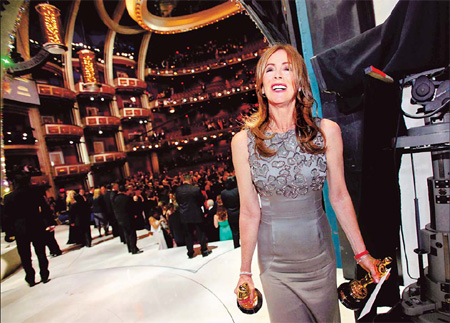Avatar is Chinese choice
 |
|
The Hurt Locker director Kathryn Bigelow walks off the Kodak Theater stage after making Oscar history as the first woman to win the best director category. The Iraq War bomb-diffusing drama also won best picture - the lowest-grossing movie in the modern era to win Hollywood's highest award. |
Chinese film fans were mostly disappointed by the unexpected shutout of Avatar in the major categories at the 82nd Academy Awards. Most bet on the $2 billion juggernaut for the Best Picture award, and when my fellow guest at Sina.com's Oscar show openly rallied for The Hurt Locker, he instantly received text messages denouncing him.
It is understandable why Chinese filmgoers prefer Avatar. It is a runaway hit, and is still packing them in at all 3D venues. People can read all kinds of messages into it and many regard a trip to Pandora as their best movie experience.
The Hurt Locker, on the other hand, is harder to decipher. Most here tend to misinterpret its message. Even the normally liberal Beijing News reckoned it was Pentagon propaganda. It's a war movie, but it does not offer much fun or gratuitous violence. The impact of war on the protagonist and the morbid nature of his fascination with danger, simply eludes those not familiar with the culture, or not interested in anything except the explosions.
This gap between Oscar voters and movie viewers in China is a clear testament to the power of movies as escapist or fantasy fare to audiences here. People do not want to go to the theater to watch a sharper replica of reality, but to forget about it.
But the Academy, by doling out the highest accolades to The Hurt Locker, has taken a big step by embracing small movies that make us face the ugliness of our world and human nature.
Chinese audiences also love big stars. If we could vote, we would no doubt have made George Clooney the Best Actor and Meryl Streep the Best Actress. Sandra Bullock is less appreciated here for her role in The Blind Side because we are not familiar with southern women with their sharp personality and unique twang. I often remind movie fans here that the role of an American southern femme is more or less like a northeastern woman in China. If a Hong Kong star was so convincing in such a role, she would surely be recognized by her peers as a good actress.
Quentin Tarantino has a loyal following in China. They rallied for his Inglourious Basterds, which nabbed only one award, for Best Supporting Actor. Tarantino has won a lot of goodwill in China partly because he is a big advocate of Hong Kong movies and he shot his Kill Bill in Beijing. The way he manipulated violence as a dramatic element also appealed to a young male demographic.
To my surprise, The Cove, which won Best Documentary Feature, has been available to a lot of people and elicited strong reactions. There has been an avalanche of condemnation against the Japanese practice of killing dolphins. Some swore that they would never eat shark's fin again. Although it is almost impossible for documentaries to be screened in theaters, the underground distribution of this and the other nominated works, to a certain extent, will serve to awaken some people to the need for a healthier and nature-friendly lifestyle.
With all three submissions from Chinese mainland, Hong Kong and Taiwan for the Best Foreign Language Film shut out from the final round of Oscar competition, this year's Oscar season had little for domestic fans to jump up and down about. They prayed for James Cameron - Titanic was also huge in China - but failing that, they will keep queuing up for tickets to the floating mountain that some have claimed was based on a peak in Hunan province's Zhangjiajie.
Raymond Zhou is a renowned film critic.
 0
0 







Go to Forum >>0 Comments